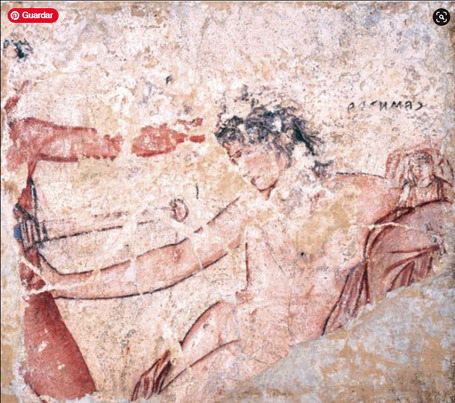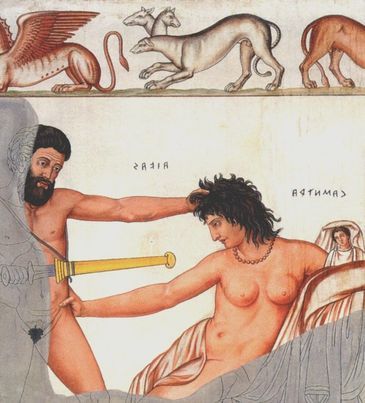#In the account of Dares the Phrygian
Text
I love Uncle Rick. He's a great dude (I think lol). But I will NEVER forgive him for how he wrote Achilles in The Last Olympian. If you know, you know.
#... a large chest#a fine mouth#and powerfully formed arms and legs. His head was covered with long wavy chestnut-colored hair. Though mild in manner#he was very fierce in battle. His face showed the joy of a man richly endowed.#achilles#WITH SHORT HAIR!?!?!?#SHORT BLACK HAIR!?!?!?!#THE FUCK#In the account of Dares the Phrygian#Achilles was described having#homer just says xanthos and purros/pyrrus(??)#which is just “shining” and “fiery/red”#so achilles was a ginger basically#with long hair because achilles with short hair makes no fucking sense T-T#i don't even like the achilliad that much but like...#come on rick?#the last olympian#percy jackon and the olympians#pjo books#percy jackson#the iliad#trojan war#uncle rick#rick riordan#pjo
48 notes
·
View notes
Text

My brain is too full of Mycenaean/Minoan frescos, I just had to create something. And what better than a first attempt at the face that lunched a thousand ships.
#don’t pay attention to the anatomy it was supposed to be something fast to get some ideas done so I didn’t use any references#am I 100% proud of this? no#but I haven’t drawn in my phone for over two years and it was like learning all over again#the Iliad#the illiad#trojan war#epic cycle#helen of sparta#helen of troy#my art#myart#mycenaean#I could share a full list of the references I used for the design but it would be too long#also#in the account of dares the Phrygian he says Helen has a beauty mark between her eyebrow#and let me tell you#that’s canon#and so cute
51 notes
·
View notes
Note
Apparently the account of Dares the Phrygian is not certain whether it is of Latin origin or whether it came from a Greek original. Do you know if Dictys Cretenses is in a similar situation or is it possible to be "sure" if it's Greek or Roman?
I was honestly not familiar with this text at all, but I did a quick search on jstor out of curiosity. Apparently a fragment of the original Greek text was found amongst the Tebtunis papyri and published in 1908. The question was then seen as settled ("The Greek Dictys", Nathaniel E. Griffin, The American Journal of Philology, Vol.29, No.3, 1908).
Now that was a long time ago, so I skimmed through an article from 2012, "Diktys of Crete", Peter Gainsford, The Cambridge Classical Journal, Vol.58. He mentioned that three other fragmentary papyri of the original Greek text existed, two of which were published in 2009. So at least then there seems to have been a consensus that there was a Greek original which dates to the late second century CE?
If anyone has more updated information, feel free to add.
11 notes
·
View notes
Note
Γεια σου θείτσα! Λίγο από το πουθενά θα είναι αυτό που θα ρωτήσω μα έχω μια απορία: γιατί όλες οι μεταγενέστερες απεικονίσεις της Κασσάνδρας την παρουσιάζουν ως κοκκινομάλλα; Η παλαιότερη αναπαράστασή της ως κοκκινομάλλα που μπορώ να βρω είναι από Ρωμαικό ψηφιδωτό στην Πομπηία που αν δεν απατώμαι χρονολογείται κάπου στα μ. Χ. Οι πιο παλιές δε αναπαραστάσεις της Κασσάνδρας την απεικονίζουν ως μαυρομάλλα, όπως βέβαια απεικονίζουν και όλους ή και τους περισσότερους χαρακτήρες επάνω σε αγγεία, όπως και τον Αχιλλέα, που τα μαλλιά του παραδοσιακά είναι ξανθά. Μήπως μου ξεφεύγει κάποια πηγή ή υπάρχει κάποιος συμβολισμός πίσω από αυτή την επιλογή που μου διαφεύγει; Ευχαριστώ πολύ όπως και να χει! 😊
Νε καλησπερα σας, ξερω οτι αργησα εναν μηνα και βαλε να απαντησω και ελπιζω η πληροφορια αυτη να ειναι ακομα χρησιμη 😄 Θα συνεχισω στα Αγγλικα αν δε σε πειραζει, για να το βρει ο οποιοσδηποτε αυτο το ποστ και να μπορεσει να το διαβασει.
I think there's a wide range of hair colors Cassandra could have.
Cassandra's beauty was even compared to that of Aphrodite* and Helen of Troy. Aphrodite has been depicted with blond, brown, orange, and black hair by the ancient Greeks, so Cassandra could have any of those colors too.
*The Iliad, Book 24
"Neither was any other ware of them, whether man or fair-girdled woman; but in truth Cassandra, peer of golden Aphrodite, having gone up upon Pergamus, marked her dear father as he stood in the car…."
Then we have this Etruscan fresco of the Francois Tomb, depicting her with black (or at least dark) hair.


The names are Etruscan and mirrored in the picture (Caśntra is Cassandra).
Cassandra was also described by the chronicler Malalas in his account of the Chronography as "shortish, round-faced, white, mannish figure, good nose, good eyes, dark pupils, blondish, curly, good neck, bulky breasts, small feet, calm, noble, priestly, an accurate prophet foreseeing everything, practicing hard, virgin".
Meanwhile, in the account of Dares the Phrygian, she was illustrated as ". . .of moderate stature, round-mouthed, and auburn-haired."
Soooo... anything goes, really 😂
18 notes
·
View notes
Text
A not fully exhaustive list of rewards offered to Paris in various sources, partially from my own checking and partially taken from Cristian Mancilla's thesis Artistic and literary representations of the Judgement of Paris in antiquity. They're roughly ordered from earliest to latest!
The Iliad ; -- / -- / "the lust women feels"/furnished him with most griveous lust/"maschlosyne" [no mention of other potential gifts, not even Helen, but she might be implied as in some other cases, two gifts were included; or, like in Dionysalexandros, the gift was used to seduce Helen into leaving with him]
Cypria ; -- / -- / Helen [we don't know what, if anything, the other two goddesses offered, as Proclus' summary doesn't mention this and there are no surviving fragments otherwise]
Cratinus, Dionysalexandros ; unshaken sovereignty / courage in war / becoming the most beautiful and beloved by all [+Helen? or does Dionysos simply use his gift to seduce Helen into leaving with him?]
Euripides, Trojan Women ; king of Europe and Asia / command of all Phrygians and destruction of Hellas / Helen (as told by Helen)
Isokrates, Encomium of Helen ; rule of all Asia / victory in battle / Helen
Ovid, Heroides ; "thrones" / might in war / love + Helen
Hyginus, Fabulae ; rule all lands and dominate the rest in wealth / strongest among mortals and know all skills / marriage with Helen
(Pseudo-)Apollodorus, Bibliotheke ; king over all men / victory in war / Helen in marriage
Apuleius, the Golden Ass/Metamorphoses ; kingship of all Asia / prowess in war / "a bride unmatched in beauty, one like [Aphrodite]" = Helen
Lucian, Judgement of the Goddesses ; lord of all Asia / great conqueror, always given victory / Helen
Dares Phrygius ; -- / -- / "the woman deemed most loveliest in Greece" = Helen [only, no other gifts offered, the Judgement is also a dream]
Dictys Cretensis ; -- / -- / -- [no judgement at all?]
Colluthus, Abduction of Helen ; king of all Asia / prowess in war/victory / Helen
Excidium Troiae ; multiplication of his flocks with each birth (twin calves each time) / victory in battle / Helen
After this comes the more allegorical takes, usually omitting gifts and merely talking about what the goddesses "represents". A small number of these come from before 0 CE, but most of them are post 0, and the further we get into Christian cultural domination, the more... forced and out there the allegorical interpretations become.
As you see, most of the gifts have "practical" application and effect on both Paris' life and the lives of everyone around him. And since the gifts are given to Paris, you can't judge the quality of them without the context of who he is (a prince of Troy) and what that means in effects on Troy.
Hera's gift(s) 99% of the time means a majority of the part of his family that would be eligible to take the throne after Priam (as well as Priam himself) would have to be done out of the way with for Paris to get what she's promising him.
-In a way, choosing Hera might leave Troy itself standing, but the royal family (the source of Hera's ire) would mostly not be. This leaves out accounting for the losing goddesses' feeling of offense and their potential retaliation.
Athena, basically every time we're not talking in an allegorical application (Hyginus stands out), does not offer "wisdom" or "skill in crafts" or similar; she is a war goddess and offers him a gift commensurate with that.
-A gift, I'd like to point out, that while it would undoubtedly look the best initially, means there needs to be war.
And if you're conducting war on your neighbours, they might get... cranky... and come to make you unable to continue to wage war on you. Whether this would be a deadlier version of a Trojan war than the one where Helen is taken we can leave open. This again doesn't account for inclusion of retaliation from Hera and Aphrodite.
#the iliad#trojan war#greek myth thoughts#hi time for me to talk about the judgement and its actual or possible consequences again!#everyone choosing Athena and I'm like#so you want to go to war#is that it
27 notes
·
View notes